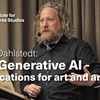designers
Webinar: The Urgency of Prototyping Better Futures
If we wish to achieve a more inclusive, sustainable, diverse and equitable world, we urgently need a diversity of perspectives to imagine – and to build – better futures. The problems we face today arBased on experiments made at the Museum of Tomorrow in Rio de Janeiro, this presentation will show how positive futures can be prototyped to inspire change. Using key techniques, processes, methodologies, mindsets and tools, you too can become an active participant in shaping preferred futures!Welcome to a seminar with Marcela Sabino, a foresight strategist, creative director and innovation designer.This seminar is organized by Positive Future and is free upon registration. .
Emergent Cultural Differences in Online Communities’ Norms of Fairness
Games and Cultures, doi.org/10.1177/1555412018800650 Abstract Unpredictable social dynamics can dominate social outcomes even in carefully designed societies like online multiplayer games. According to
Palle Dahlstedt: Big generative AI - Implications for creativity, art, and artists
Date & Time: Wednesday, June 12 at 10:00-11:45 (CET)Venue: Institutet för framtidsstudier, Holländargatan 13, 4th floor, Stockholm, or online. Research seminar with Palle Dahlstedt, Professor in In

Big generative AI - Implications for creativity, art, and artists
Research seminar with Palle Dahlstedt, Professor in Interaction Design at Gothenburg University. In this lecture, Palle Dahlstedt will share a pragmatic, critical, and visionary view of what machine l
Possible Worlds: Towards a New Imaginary
Venue: Uppsala Konsert & Kongress The internationally recognized philosopher Timothy Morton and innovation expert Michela Magas meet game designer Doris Rusch and futurist Karim Jebari in a captivat
Putting the person in to the particle
Report on seminar 'Modelling Social Mechanisms for Knowledge Generation & Exploration' by Nanda Wijermans (Stockholm Resilience Centre) Over the last decade physicists have developed “social force”
The ambivalence of desistance: Balancing in the liminal space between deviance and conventionality
European Journal of Criminology Abstract Building and expanding on contemporary research where desistance is increasingly conceived of asa fragile and liminal experience, this paper examines the early dof ambivalence – an undertheorised concept in life course criminology. This paper employs qualitativeinterviews from a total of 10 participants who participated in SIG, a voluntary defector programmein Sweden. Despite having formulated a clear resolve to desist, the participantsnonetheless experienced feelings of ambivalence in relation to the desistance process. In theseinstances, the aspiring desisters were bordering between the prospects of a better, crime-freelife and the pains, losses, struggles and frustrations accompanying the early stages of desistance.It is argued that this liminal position, where the old life is to be discarded and a new, better lifeis yet to be built, may constitute a breeding ground for ambivalence – a state which needs tobe grounded in the precarious social position of marginalised youth which aspiring desisters typicallyoccupy.
Urban Futures from Essentials to Experiences - The transformative role of marketplaces in 21st century cities
Place: The Institute for Futures Studies, Holländargatan 13, StockholmRegister hereInformality is on the rise. From remote labour and services-on-demand to food trucks and pop-up shops, its transformat

Labour market policies against the odds? Job finding among participants in ESF projects in comparison with the Public Employment Service
Research report 2014/1, 115 p. The European Social Fund (ESF) has complemented the Swedish Employment Service’s work assisting job seekers in finding new jobs, by financing projects specifically design
The global study of everyday norms - seminar with Kimmo Eriksson
Venue: Institute for Futures Studies, Holländargatan 13 in Stockholm, or online Society’s everyday norms specify which behaviors are socially acceptable in which situations. How similar or different are








